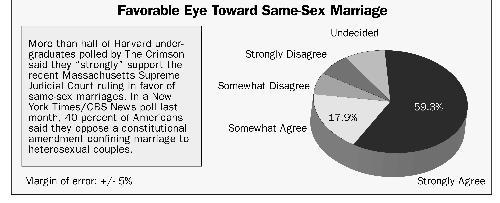
News
Cambridge Residents Slam Council Proposal to Delay Bike Lane Construction

News
‘Gender-Affirming Slay Fest’: Harvard College QSA Hosts Annual Queer Prom

News
‘Not Being Nerds’: Harvard Students Dance to Tinashe at Yardfest

News
Wrongful Death Trial Against CAMHS Employee Over 2015 Student Suicide To Begin Tuesday

News
Cornel West, Harvard Affiliates Call for University to Divest from ‘Israeli Apartheid’ at Rally
Majority of Students Support Gay Marriage

A majority of Harvard students agree with a recent Massachusetts Supreme Judicial Court ruling that declared a ban on gay marriage unconstitutional.
Roughly 77 percent of students said in a mid-December Crimson poll that they support the Supreme Judicial Court’s November decision. The verdict gave the state legislature 180 days to change Massachusetts law to allow homosexual couples to marry.
Of the 365 poll respondents, a majority—59 percent—said they “strongly” endorse the decision.
And the 16 percent of undergraduates who said they disagree with the verdict remain split between “somewhat” and “strongly” opposing the outcome.
The issue remains a divisive one among students who indicated they would vote Republican in a hypothetical Congressional election.
A plurality of these Republican-leaning students—49 percent—said they support the Massachusetts Supreme Judicial Court decision. But 43 percent said they disagreed with the outcome.
Of the Democratic-leaning respondents, 86 percent concurred with the ruling, with more than half concluding that they “strongly” agreed with it.
The findings deviate from the national opinion.
About 55 percent of Americans agree a constitutional amendment should confine marriage to heterosexual couples, whereas 40 percent disagreed according to a New York Times/CBS News poll conducted in mid-December.
Noting the more liberal bent of Harvard students compared to the rest of the nation, Kenan Professor of Government Harvey C. Mansfield ’53 described the campus as a “hothouse where students come together to learn by osmosis and by reinforcement.”
“It’s not only more liberal but more conformist just because there is a great majority on one side,” he said. “And that majority doesn’t seek to confirm its view by argument...but rather enjoys it. It’s like a person hugging himself.”
But Adam P. Schneider ’07, public relations chair for the Bisexual, Gay, Lesbian, Transgender and Supporters’ Alliance (BGLTSA), said that he believes the results reflect a “generational issue.”
“As the recent New York Times poll showed, younger people are more likely to support same-sex marriage,” Schneider, who is also a Crimson editor, wrote in an e-mail. “This trend is very encouraging.”
While the Massachusetts ruling has drawn considerable controversy, Institute of Politics Director Daniel R. Glickman said that he believes the upcoming election will focus on “more conditional issues” like the job market, the economy and the war. Instead, same-sex unions would be a battle of wills among Republicans, he said.
“Gay marriage will be a real test of the Republican Party. Forces in the right wing would really like to push this issue,” he said.
But Mansfield pointed to the one vote difference in the 4-3 ruling to argue that the decision does not represent widespread support for gay marriage.
“I think that the Massachusetts court decision will help reelect George
Bush...It’s another instance of undemocratic manipulation of law and constitution by liberal justices,” he said.
—Staff writer Margaret W. Ho can be reached at mwho@fas.harvard.com.
Want to keep up with breaking news? Subscribe to our email newsletter.
